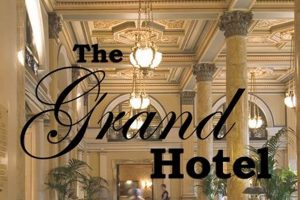The term typically describes a luxurious establishment offering high-end accommodations and services. Such establishments often feature amenities like fine dining restaurants, spas, concierge services, and elegantly appointed rooms. A hypothetical example could be a landmark property in a major city, boasting opulent suites and a renowned history of hosting distinguished guests.
Luxury accommodations play a significant role in the hospitality industry, providing travelers with premium experiences and contributing to the economic vitality of their locations. Historically, grand hotels have served as social hubs and symbols of prestige, reflecting the architectural and cultural trends of their eras. They often become integral parts of a city’s identity, attracting both leisure and business travelers seeking elevated comfort and service.
This discussion will further explore related concepts such as the evolution of luxury hospitality, the impact of such establishments on local communities, and the future trends shaping this segment of the travel industry.
Tips for Selecting Luxurious Accommodations
Choosing the right upscale lodging requires careful consideration of various factors to ensure a truly exceptional experience. The following tips offer guidance for selecting an establishment that aligns with individual preferences and expectations.
Tip 1: Research Location and Amenities: Thorough research is crucial. Consider proximity to desired attractions, available services (e.g., spa, fitness center, business facilities), and the overall ambiance of the surrounding area.
Tip 2: Read Reviews and Compare Ratings: Guest reviews offer valuable insights into the quality of service, cleanliness, and overall guest satisfaction. Comparing ratings across different platforms provides a comprehensive perspective.
Tip 3: Consider Room Types and Views: Evaluate the different room categories and select one that suits specific needs and preferences. Consider views, room size, and available amenities within the room itself.
Tip 4: Explore Dining Options: Luxurious establishments often feature multiple dining venues. Investigate the available cuisine options, dress codes, and reservation policies.
Tip 5: Examine Cancellation Policies: Understanding cancellation policies is essential for flexibility and mitigating potential financial risks in case travel plans change.
Tip 6: Evaluate Value for Money: Compare prices and amenities offered by different establishments to ensure optimal value for the investment. Consider packages or special offers that may enhance the overall experience.
Tip 7: Contact the Establishment Directly: For personalized service and clarification of any specific requirements or questions, direct communication with the chosen accommodation is recommended.
By considering these factors, travelers can make informed decisions and select accommodations that offer a memorable and luxurious experience. These considerations contribute to a seamless and enjoyable stay.
This guidance provides a foundation for selecting the ideal luxurious accommodation. The subsequent conclusion will summarize key takeaways and offer final recommendations for discerning travelers.
1. Luxury
Luxury forms a cornerstone of the “hotel grande” concept, representing a commitment to providing exceptional quality, comfort, and exclusivity. Understanding its various facets reveals how it shapes the guest experience and distinguishes these establishments.
- Personalized Service:
Personalized service anticipates and caters to individual guest needs, exceeding standard expectations. Examples include dedicated butlers, personalized welcome amenities, and proactive concierge services arranging bespoke experiences. This facet enhances guest satisfaction and fosters a sense of exclusivity crucial to the “hotel grande” experience.
- High-Quality Amenities:
High-quality amenities elevate comfort and convenience. Examples include state-of-the-art fitness centers, luxurious spa facilities, fine dining restaurants with renowned chefs, and meticulously designed rooms featuring premium furnishings and technology. These amenities contribute to a sense of opulence and pampering, reinforcing the luxury aspect of a “hotel grande.”
- Exclusive Experiences:
Exclusive experiences differentiate a “hotel grande” by offering unique opportunities unavailable elsewhere. These can range from private art collections and curated tours to access to exclusive events and personalized itineraries. Such experiences create lasting memories and contribute to the overall perception of luxury.
- Elegant Design and Aesthetics:
Elegant design and aesthetics play a vital role in creating a luxurious atmosphere. Attention to detail in architecture, interior design, and landscaping contributes to a visually appealing and sophisticated environment. The use of high-quality materials, curated artwork, and thoughtful design elements reinforces the sense of luxury and refinement expected in a “hotel grande.”
These facets of luxury intertwine to create a holistic experience that defines a “hotel grande.” The emphasis on personalized attention, premium amenities, exclusive access, and elegant design distinguishes these establishments and solidifies their position within the luxury hospitality sector. This focus on curated experiences enhances guest satisfaction and cultivates a sense of prestige associated with the “hotel grande” brand.
2. Prestige
Prestige forms an integral component of the “hotel grande” identity, significantly influencing its market position and guest perception. This prestige derives from a confluence of factors, including historical significance, architectural grandeur, renowned service, and an association with exclusivity. A strong reputation built over time contributes significantly to the perceived value and desirability of such establishments. For example, hotels with a history of hosting royalty or dignitaries, or those recognized for their iconic architecture, often command a higher level of prestige. This, in turn, influences guest expectations and willingness to invest in the experience.
The link between prestige and a “hotel grande” is demonstrably symbiotic. A prestigious reputation attracts discerning clientele seeking high-quality experiences, while the patronage of such clientele further enhances the establishment’s prestige. This cyclical relationship reinforces the brand image and contributes to sustained market leadership. Furthermore, prestige translates into tangible benefits, including premium pricing, increased occupancy rates, and the ability to attract top talent within the hospitality industry. Understanding this connection allows for strategic management of brand image and the cultivation of a loyal customer base.
In conclusion, prestige serves as a key differentiator for “hotel grande” establishments. Cultivating and maintaining this prestige requires consistent delivery of exceptional service, upholding high standards of quality, and strategic brand management. The challenge lies in adapting to evolving guest expectations while preserving the historical legacy and inherent values that contribute to the hotel’s prestigious image. This dynamic interplay between tradition and innovation ensures the continued relevance and appeal of “hotel grande” within the luxury hospitality landscape.
3. Exceptional Service
Exceptional service constitutes a cornerstone of the “hotel grande” experience, directly influencing guest satisfaction, brand reputation, and overall business success. It represents a commitment to exceeding expectations, anticipating guest needs, and providing personalized attention that fosters a sense of value and exclusivity. This commitment manifests in various forms, including proactive concierge services, personalized welcome amenities, efficient and discreet housekeeping, and readily available assistance for any guest requirement. Cause and effect are clearly intertwined: exceptional service leads to heightened guest satisfaction, positive reviews, and increased loyalty, ultimately contributing to the hotel’s profitability and market standing. Conversely, subpar service can damage reputation and deter potential guests. For instance, a “hotel grande” might offer bespoke itinerary planning, private transportation arrangements, or in-room dining experiences tailored to individual dietary preferences, demonstrating a dedication to exceptional service. These personalized touches cultivate a sense of being valued and contribute to a memorable stay.
The importance of exceptional service as a component of the “hotel grande” experience cannot be overstated. It serves as a key differentiator in a competitive market, justifying premium pricing and attracting discerning clientele. Guests staying at such establishments expect a level of service that surpasses the ordinary, reflecting the hotel’s commitment to luxury and exclusivity. Practical implications of this understanding include investing in staff training, empowering employees to make decisions that benefit guests, and establishing clear service standards that align with the “hotel grande” brand identity. Furthermore, actively soliciting and responding to guest feedback provides valuable insights for continuous improvement and ensures that service delivery remains aligned with evolving guest expectations. Consider a scenario where a guest expresses a preference for a specific type of tea; a “hotel grande” committed to exceptional service would ensure that this preference is noted and fulfilled throughout the guest’s stay, demonstrating attentiveness to detail and personalized care.
In summary, exceptional service is not merely a desirable feature but a fundamental requirement for a “hotel grande.” It represents a tangible expression of the hotel’s commitment to luxury, contributing significantly to guest satisfaction, brand reputation, and business success. Maintaining consistently high service standards requires ongoing investment in training, empowering staff, and actively seeking guest feedback. Challenges may include managing staffing costs while maintaining personalized service levels and adapting to the evolving expectations of a discerning clientele. However, successfully navigating these challenges reinforces the “hotel grande” brand promise and solidifies its position within the luxury hospitality market.
4. Prime Location
A prime location is integral to the identity and success of a “hotel grande,” significantly impacting its appeal and market value. The strategic placement of such establishments within desirable areas enhances accessibility, convenience, and the overall guest experience. This discussion will explore the multifaceted nature of prime locations and their crucial role in defining a “hotel grande.”
- Accessibility and Connectivity:
Convenient access to major transportation hubs, including international airports, train stations, and major roadways, is paramount. Proximity to these hubs simplifies travel logistics for guests and enhances the hotel’s overall accessibility. A “hotel grande” situated near a major international airport, for example, benefits from increased visibility and ease of access for international travelers. This strategic placement contributes to higher occupancy rates and reinforces the hotel’s position as a preferred destination for global clientele.
- Proximity to Key Attractions:
A prime location often entails proximity to key attractions, business districts, cultural landmarks, and entertainment venues. This advantageous positioning enhances the guest experience by minimizing travel time and maximizing opportunities for exploration and leisure. For instance, a “hotel grande” located in a city’s historic center, near renowned museums and cultural sites, offers guests convenient access to enriching experiences. This proximity adds value to the overall stay and caters to discerning travelers seeking cultural immersion.
- Desirable Surroundings:
The surrounding environment plays a crucial role in shaping guest perceptions and influencing their overall experience. “Hotel grande” establishments often seek locations in upscale neighborhoods characterized by attractive landscapes, well-maintained infrastructure, and a sense of security and exclusivity. A hotel situated near a picturesque park or overlooking a scenic waterfront, for example, offers guests a tranquil and aesthetically pleasing environment, enhancing their sense of well-being and contributing to a luxurious experience.
- Market Value and Investment Potential:
Prime locations contribute significantly to a hotel’s market value and long-term investment potential. Properties situated in desirable areas tend to appreciate in value over time, offering attractive returns for investors. Furthermore, a prime location enhances the hotel’s ability to attract premium clientele and command higher room rates, contributing to increased profitability and a strong return on investment. The scarcity of prime real estate in sought-after destinations further amplifies the value of strategically located “hotel grande” establishments.
In conclusion, a prime location is not merely a geographical attribute but a strategic asset that significantly contributes to the success and prestige of a “hotel grande.” Careful consideration of accessibility, proximity to attractions, desirability of surroundings, and market value implications are essential in selecting the optimal location for such establishments. This strategic approach maximizes guest satisfaction, reinforces brand image, and ensures long-term financial viability. Furthermore, the connection between a prime location and the “hotel grande” concept underscores the importance of place as an integral component of the luxury hospitality experience.
5. Elegant Design
Elegant design is fundamental to the “hotel grande” experience, inextricably linked to its brand identity and market positioning. It represents a commitment to aesthetics, sophistication, and creating a visually appealing environment that enhances guest comfort and fosters a sense of luxury. This discussion will explore the multifaceted nature of elegant design and its crucial role in defining a “hotel grande.”
- Architectural Style and Grandeur:
The architectural style of a “hotel grande” often reflects a sense of grandeur and timelessness. Whether it’s a classic, art deco, or contemporary design, the architecture plays a vital role in creating a first impression and setting the tone for the overall guest experience. Examples include the ornate facades of historic grand hotels or the sleek lines of modern luxury establishments. The architectural style contributes significantly to the hotel’s visual appeal and reinforces its position within the luxury market segment. A well-executed architectural design creates a lasting impression and sets the stage for the luxurious experience within.
- Interior Design and Ambiance:
Interior design plays a pivotal role in shaping the ambiance and overall guest experience. Careful selection of furnishings, color palettes, lighting, and artwork contributes to a cohesive and aesthetically pleasing environment. Examples include the use of luxurious fabrics, bespoke furniture, and carefully curated art collections. These design elements create a sense of sophistication and refinement, reinforcing the “hotel grande” brand identity. A well-designed interior fosters a sense of comfort and tranquility, enhancing guest satisfaction and contributing to a memorable stay.
- Landscaping and Outdoor Spaces:
Landscaping and outdoor spaces extend the elegant design beyond the building’s walls, creating inviting areas for relaxation and recreation. Meticulously manicured gardens, tranquil courtyards, or rooftop terraces with stunning views enhance the overall guest experience and contribute to a sense of luxury. Examples include lush gardens with fountains, private cabanas surrounding a sparkling pool, or rooftop bars offering panoramic city views. These outdoor spaces provide guests with opportunities to unwind and enjoy the hotel’s surroundings, further enhancing their overall experience.
- Attention to Detail and Craftsmanship:
Attention to detail and craftsmanship are evident throughout a “hotel grande,” reflecting a commitment to quality and meticulous execution. From the selection of materials to the finishing touches, every aspect of the design is carefully considered. Examples include the use of high-quality textiles, handcrafted furniture, and custom-designed lighting fixtures. This attention to detail elevates the overall aesthetic and reinforces the sense of luxury and exclusivity associated with the “hotel grande” brand. These seemingly small details contribute significantly to the overall impression of quality and refinement, enhancing the guest experience and contributing to a sense of being pampered.
These elements of elegant design work in concert to create a cohesive and luxurious experience that defines a “hotel grande.” The emphasis on architectural grandeur, sophisticated interiors, meticulously landscaped grounds, and attention to detail distinguishes these establishments and reinforces their position within the luxury hospitality sector. The strategic implementation of elegant design principles contributes significantly to guest satisfaction, brand reputation, and the overall success of a “hotel grande.” Furthermore, the inherent connection between elegant design and the perception of luxury highlights its importance in shaping guest expectations and creating a memorable experience.
Frequently Asked Questions
This section addresses common inquiries regarding establishments categorized as “hotel grande,” providing concise and informative responses.
Question 1: What distinguishes a “hotel grande” from other luxury hotels?
Key distinctions often include a rich history, iconic architecture, exceptional service levels exceeding typical luxury standards, and a prestigious reputation. These establishments frequently occupy prime locations and offer unique, curated experiences.
Question 2: What amenities can one typically expect in a “hotel grande”?
Expected amenities often include multiple fine-dining restaurants, luxurious spa facilities, state-of-the-art fitness centers, expansive meeting and event spaces, personalized concierge services, and elegantly appointed accommodations with premium features.
Question 3: How does pricing typically compare to other luxury accommodations?
Pricing typically reflects the elevated level of service, amenities, and exclusivity offered. Rates often exceed those of standard luxury hotels, commensurate with the enhanced experience provided.
Question 4: What factors should one consider when selecting a “hotel grande”?
Key considerations include location, desired amenities, historical significance, guest reviews, and overall reputation. Careful research and comparison are essential to ensure alignment with individual preferences and expectations.
Question 5: What is the typical target demographic for these establishments?
The target demographic typically comprises discerning travelers seeking exceptional quality, personalized service, and unique experiences. This often includes business executives, affluent leisure travelers, and individuals celebrating special occasions.
Question 6: How do these establishments adapt to evolving traveler expectations?
Adaptation involves continuous innovation in service delivery, integration of technology, personalized experiences, and sustainable practices. Maintaining relevance requires anticipating and responding to changing guest preferences while preserving the core values of luxury and prestige.
Understanding these aspects provides valuable insights for travelers seeking the distinctive experience offered by a “hotel grande.”
The following section will explore specific examples of renowned establishments that exemplify the “hotel grande” concept.
Conclusion
This exploration has provided a comprehensive overview of the “hotel grande” concept, examining its defining characteristics, which include luxurious accommodations, exceptional service, prime locations, and elegant design. The symbiotic relationship between prestige, guest experience, and market positioning has been highlighted, underscoring the importance of each element in contributing to the overall success and enduring appeal of these establishments. Furthermore, the analysis of frequently asked questions addressed common inquiries, offering practical insights for discerning travelers.
The “hotel grande” concept represents a timeless pursuit of excellence within the hospitality industry. Its enduring appeal lies in the promise of an elevated experience that transcends mere accommodation, offering a curated blend of luxury, prestige, and personalized service. As traveler expectations continue to evolve, establishments embracing the “hotel grande” ethos must adapt and innovate to maintain their position within the luxury market. The ongoing challenge lies in balancing tradition with innovation, preserving the core values of a “hotel grande” while embracing the future of luxury hospitality. This commitment to excellence ensures the continued relevance and allure of the “hotel grande” experience for generations to come.







